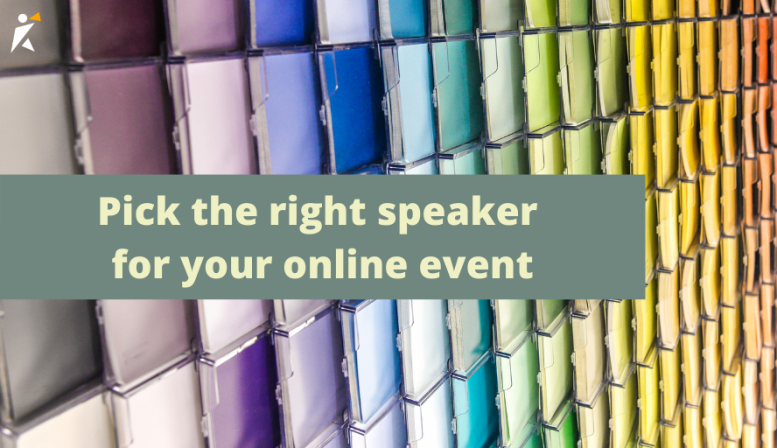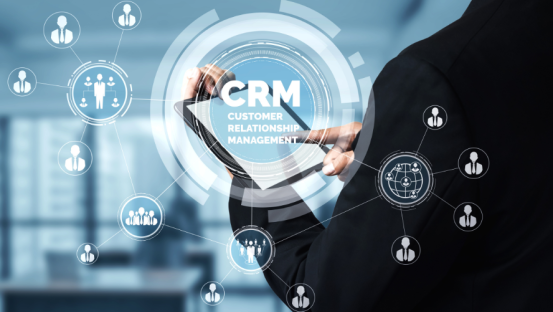How to Pick the Right Speaker for Your Online Event

You just thought of a great concept for an event.
You have a huge database of contacts, many of whom you think will be interested in attending.
You did your research and have chosen the best platforms for your online event.
You have a timeline and a great team around you that can help deliver the event.
Time to get to work.
There are a lot of logistical aspects involved in organizing an online event, and they will surely take some time to sort out. But this isn’t the most difficult, or even the most important part of the work. It may seem to you that once you have the concept and know what you want your event to be like, the content is taken care of — but far from it. You now have an empty matrix that you have to populate with compatible elements, or in this case, speakers. Finding the right speakers for your event will be your biggest challenge. It involves research and curation, as well as a certain amount of luck.
The beauty of content is that there are many ways to approach a topic. You’ll realize that, as soon as you start talking to speakers and explaining your ideas to them. You will notice they’ll each have a different take on the topic and throw more ideas at you than you can incorporate into a single event. This is where the curator in you has to come out and make some hard decisions.
As a program curator, I am familiar with the struggle and can empathize. I can also give you my two cents on how to approach putting together a lineup for your event so you don’t quickly become overwhelmed and lose direction.
Your Event

First things first. To be able to spot the best speakers for your virtual event, you’ll need to have a clear idea of what you want your event to be.
1. Know Your Audience
If you have a huge database of contacts, start from there. Look at the data you have gathered about people and see what you can get out of it. What field are they in, where are they in their careers, where do their interests lie, what kind of events have they attended in the past? This is all information that you can and should use when deciding on the topic of your event, the level of talks, and the format.
If you don’t have so many contacts, there’s no reason to despair. Picture your audience. Who is your event aimed at? Are they professionals or newbies? What are their interests and needs? Do they attend virtual events regularly, and if so what kind of format might be more interesting to them? Create a few attendee personas and let that guide you in your search for the right speakers. You can know your audience, even if you don’t yet know who the individuals in your audience will be.
2. Clarify Your Objectives
Once you know your audience, refine the concept. The best way to do that is to look back at the concept you already have, and the audience you plan to attract. These two elements inform each other and need to be considered together when defining objectives.
Start by answering some seemingly simple questions about your motivation, your attendees, and your potential speakers.
Why are you having this event? Is it to increase your company’s visibility, or is it to contribute to a hot topic in the industry? Maybe it’s to get answers to questions that have been on your mind for some time? It can even be as simple as creating a community of peers, or networking.
What will your attendees get from the event? By now you should have an idea of who will make up your audience. Try to go a step further and understand not just who they are but what they will want to walk away with from your event.
What do speakers need to do to contribute to the success of the event? This doesn’t mean going too much into the details of every virtual talk, but simply defining what you and your audience expect from your speakers.
Answering these questions will help you move on to defining your SMART objectives clearly. You probably already know what SMART stands for, but just in case you need your memory jogged here it is: Specific - Measurable - Attainable - Realistic - Time-bound.
Specific means your goal should sound more like “Host a conference on [specific topic]”, rather than “Host a huge virtual conference”.
To make it measurable, think more in terms of numbers than vague notions like a lot of attendees.
Be realistic when thinking about what you can do with the resources you have, to make sure your goal is attainable and you’re not setting yourself up for failure.
Last but not least, define a time-bound goal. Once you set an event date, it might seem as though your goal is implicitly time-bound. Though each event date is a deadline itself, that doesn’t mean you should just have that one final, impending deadline. Set deadlines for different stages of the project to ensure that everything comes together on the date.
The clearer your goals are, the easier it will be to decide on the right speakers.
3. Plan Your Content
You know your audience and your goals. It’s time to start working on the content. Planning the program of an event consists of constantly zooming in and out.
What I mean by that is you don’t just focus on one speaker at a time, but rather try to see where they fit in the big picture. You don’t want to have two speakers speaking about the same topic in the exact same way. Look at what makes each speaker unique and see how that fits in with the rest of the speakers. At times, you might have to give up a great speaker because they don’t add anything new to your program.
4. Consider Your Budget
Everyone wants the best quality, but not everyone can afford to pay for it. Speakers that are very much sought after will cost you. To make the right decisions for your event, you first have to look at what you can afford to pay speakers and approach those who are within your budget. There’s no point in chasing a superstar if you can’t afford to pay for one. Sometimes you’re better off splitting that budget and getting multiple speakers that contribute to the diversity of topics in your event.
The Speakers

Here comes the fun part. You’ve figured out what kind of an event you want to put together and have all your goals defined. With this in mind, you can start researching the best speakers to help you reach those goals. As previously mentioned, you’ll want to recruit a diverse range of speakers with individual strengths, styles, and focuses, but there are some general skills you should be looking for that apply to all:
1. Screen Presence
Events have changed and organizers no longer seek those with stage experience. Instead, screen presence has become essential. This can entail a number of things, from how comfortable speakers are with seeing themselves speak on screen, to how comfortable they are with technology, to whether they can use it to enhance the quality of their talk — to name but a few.
Speakers with previous experience in virtual events are essential, and there are plenty out there who have already honed the skills needed. Start your search by looking online for virtual presentations given by speakers in your field. Make a list of eligible speakers and then narrow it down to the ones that best fit your content plan.
A few things to keep in mind about this.
Not everyone is tech-savvy, but that doesn’t mean they can’t quickly learn with a bit of help. If you find an interesting speaker but they sometimes seem to run into technical difficulties, don’t cross them off your list. Instead, try to think about how you can help prevent technical issues — which is something you’ll be doing for a virtual event anyway, of course — or how you can support speakers in setting up and delivering a flawless online presentation.
It’s not just about being comfortable with technology, but being comfortable with a situation in which technology fails. Most audiences are understanding and aware that no matter what you do, technology might simply not work. If the speaker or presenter approaches issues with calm, they will be able to reassure the audience, and fix things much quicker than if they panicked.
2. Relevant Expertise
This is something that you would have had to do for a live event as well, so I will keep it short. Remember all the effort you’ve put into figuring out who your audience is, creating customer personas, and planning the content strategy? Now is the time to use all that knowledge to make informed decisions as to who your best picks are in terms of speakers.
Relevant expertise doesn’t simply mean choosing the best-known speaker in a certain niche. It means thinking about the event you have planned, and your audience, to decide whether the speaker can help you make a difference for your audience. If your event has multiple speakers, each of them should complement the others. Sometimes, no matter their level of expertise, some may not fit in.
3. Updated & Personalised Talk
Especially in times of change, it’s important to approach speakers whose presentations and talks are continuously updated. Talks from 2019 are as relevant as your grandma’s streetwear at this point. Every industry has changed tremendously in 2020 and beyond, and talks should reflect that. It’s not as easy as choosing speakers that have created new talks in the past year. Look into what their angle is, and make sure it’s in line with the event. The points speakers make should be relevant to the way in which you want to approach the topic.
If your event is unique in terms of approach, you might want to ask the speaker to customize their talk. Most speakers are happy to personalize their presentations for certain audiences and take different angles on a matter.
4. Speaker Visibility
The more visible the speaker, the more visible your event. Online visibility does not make or break a speaker, but it sure can help an event organizer.
While visibility should not be the main criterion for your choice, you can use it if you’re stuck deciding between two speakers of similar caliber. If their contributions to the topic are comparable, then you will need to consider other factors when deciding between them, and online visibility and followers is the best one. Your event will stand a better chance of reaching its target audience if the speakers booked are connected to that target audience.
Bonus Points
Cast a Wide Net
Pick your favorites but don’t get stuck on them. For various reasons, speakers might not make it. Start by contacting your first picks, but move on to the next if you haven’t heard back in a few days. The wider the net you cast, the easier it will be to pick those who fit better, instead of having to compromise on the relevance and quality of your content.
What’s in it for Them
When choosing the right speaker it’s not just about what they bring to your event but also what your event can bring to them. Besides any speaker fee, think of how participation in your event can benefit a speaker, and communicate that to them. Events, even virtual ones, are about networking for everyone involved and dropping the names of your other speakers might go a long way in persuading speakers to take part.
Conclusion
Platforms like SpeakersHub will make your life easier when trying to find the right speaker for your next virtual event. To save yourself time, this is the best place to start. You can then go down the rabbit hole and do your own independent research if you have the time.
And remember, you will only know who the right speaker is if you know exactly the kind of event you want to create.







